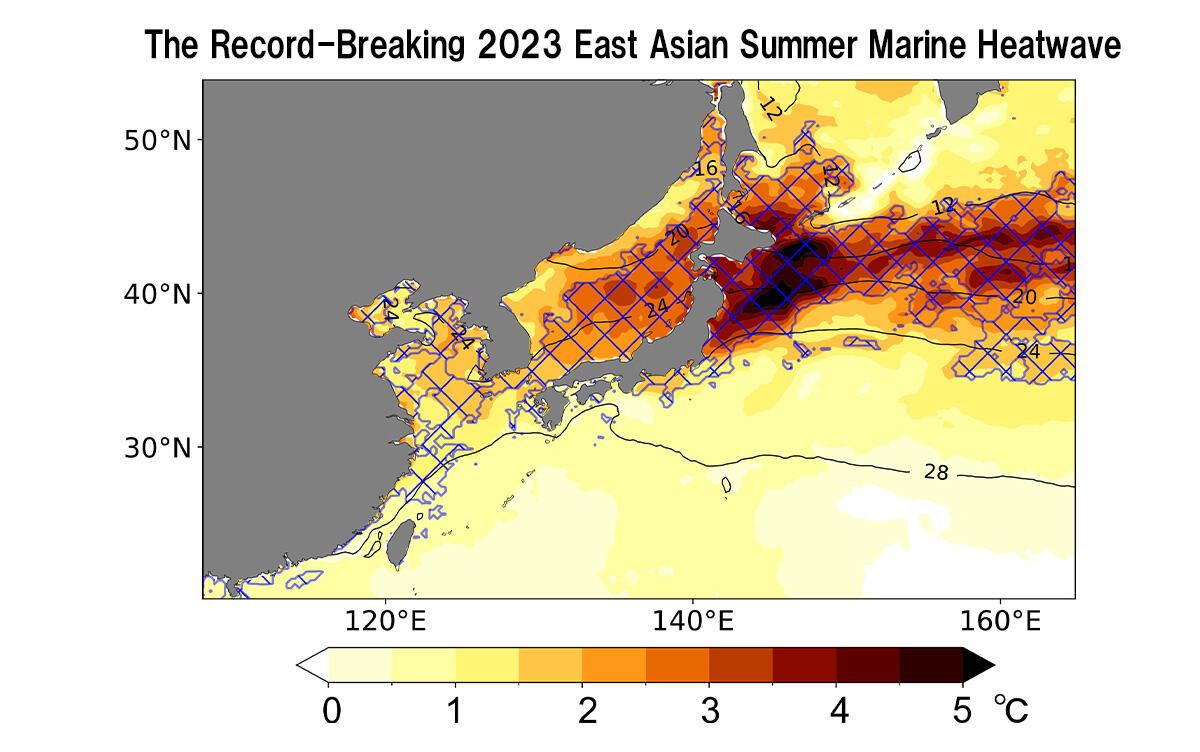Research News
Unveiling the Underlying Mechanism of the Record-Breaking 2023 East Asian Summer Heatwave: The Notable Role of Unprecedented Marine Heatwaves
 Cited from the original paper (DOI: 10.1029/2025AV001673)
Cited from the original paper (DOI: 10.1029/2025AV001673)
East Asia experienced a record-breaking heatwave in the summer of 2023. Researchers at the University of Tsukuba numerically simulated this event using an atmospheric model, revealing for the first time that this record-breaking heatwave was considerably amplified by an unprecedented marine heatwave in the surrounding seas.
Tsukuba, Japan—In the summer of 2023, East Asia, including Japan, experienced record-breaking temperatures and humidity, accompanied by unprecedented marine heatwaves in the surrounding seas. Although the simultaneous occurrence of atmospheric and marine heatwaves has drawn global attention in recent years, the mechanisms through which the 2023 marine heatwaves influenced land-based heatwaves and the magnitude of this influence have remained unclear.
To address the aforementioned issue, researchers at the University of Tsukuba conducted detailed numerical simulations of the 2023 climatic event using a regional atmospheric model. Results revealed that the 2023 marine heatwave increased both temperature and humidity, thereby considerably amplifying the East Asian heatwave. This amplification occurred in addition to the influence of anomalous large-scale atmospheric circulations. The mechanism through which marine heatwaves increased the surface temperatures involved changes in cloud cover and water vapor, which enhanced the solar radiation reaching the ground. These findings highlight that East Asia's summer climate, rich in clouds and water vapor, facilitates the amplification of atmospheric heatwaves by marine heatwaves in the surrounding seas. The recent increasing trend of sea surface temperatures has further intensified the impact of marine heatwaves on land-based heat extremes.
Understanding how marine heatwaves amplify atmospheric heatwaves is essential for improving seasonal forecasts in East Asia and preparing for future extreme weather events.
###
This study is supported in part by the Japanese Ministry of Education, Culture, Sports, Science and Technology (MEXT) through the Arctic Challenge for Sustainability II (ArCS-II; JPMXD1420318865) and the Advanced Studies of Climate Change Projection (SENTAN; JPMXD0722680395), by the Japan Science and Technology Agency through COI-NEXT (JPMJPF2013), by the Environmental Restoration and Conservation Agency through Environment Research and Technology Development Fund JPMEERF20242001 and JPMEERF20231007, and by the Japan Society for the Promotion of Science (JSPS) through Grants-in-Aid for Scientific Research 24H02223 (on Transformative Research Areas 24A203), JP22K14097, JP23K22573, and 23K00982.
Original Paper
- Title of original paper:
- Unprecedented Marine Heatwave Significantly Exacerbated the Record-breaking 2023 East Asian Summer Heatwave
- Journal:
- AGU Advances
- DOI:
- 10.1029/2025AV001673
Correspondence
Associate Professor OKAJIMA Satoru
Institute of Life and Environmental Sciences, University of Tsukuba
Associate Professor KOSAKA Yu
Research Center for Advanced Science and Technology, The University of Tokyo
Project Researcher ITO Rui
Japan Agency for Marine-Earth Science and Technology
Related Link
Institute of Life and Environmental Sciences








